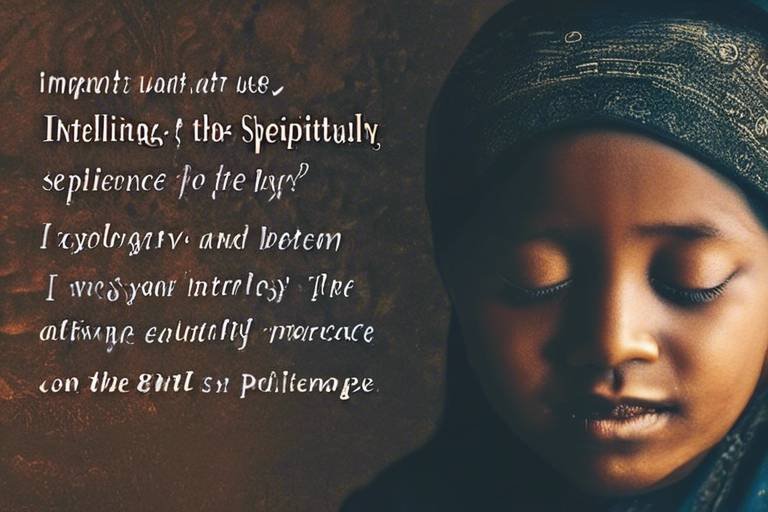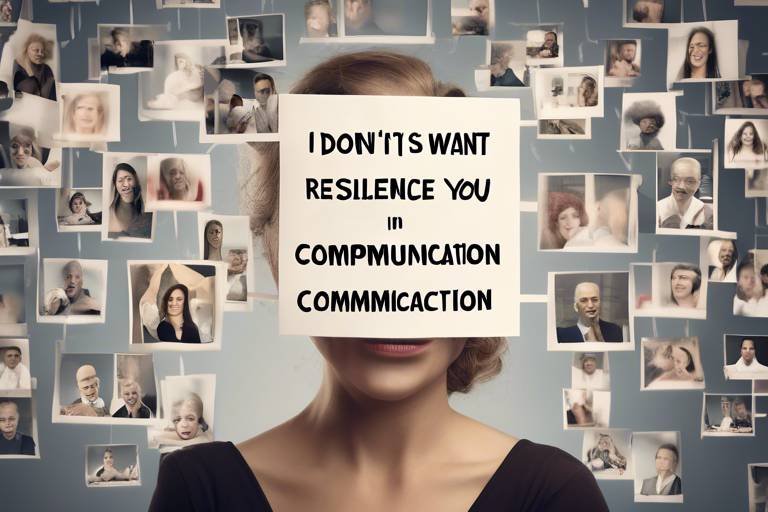The Importance of Resilience in Divorce
Divorce is often likened to navigating through a stormy sea, where the waves of emotions crash relentlessly against the shores of our lives. In such turbulent times, resilience becomes not just a lifeline but a guiding star. It’s the ability to bounce back, to adapt, and to find strength in the face of adversity. This article dives deep into the significance of resilience during divorce, illustrating how it can help individuals not only survive but thrive amidst the emotional chaos that often accompanies separation.
When a marriage ends, it can feel like the ground has been pulled from under your feet. The emotional challenges can be overwhelming, ranging from feelings of sadness and anger to confusion and fear. However, resilience acts as a buffer, allowing individuals to process these feelings without being swept away by them. Think of resilience as a muscle; the more you work on it, the stronger it becomes. It’s this strength that empowers individuals to rebuild their lives, rediscover their identities, and even foster personal growth in the aftermath of a divorce.
Understanding the role of resilience in divorce is crucial. It’s not merely about enduring the pain but finding ways to navigate through it with grace and determination. Resilience can transform a painful experience into a journey of self-discovery and empowerment. By embracing resilience, individuals can shift their focus from what they’ve lost to what they can gain, paving the way for a brighter future.
- What is resilience? Resilience is the ability to adapt and recover from difficult situations, allowing individuals to cope with stress and adversity.
- How can I build resilience during a divorce? Building resilience can involve developing coping strategies, seeking support from loved ones, and focusing on self-care.
- Why is resilience important after divorce? Resilience helps individuals manage their emotions, rebuild their lives, and embrace new opportunities that arise after separation.

Understanding Resilience
Resilience is more than just a buzzword; it's a vital life skill that enables individuals to bounce back from adversity. Think of it as your emotional trampoline—no matter how hard life throws you down, resilience helps you spring back up. But what exactly does it mean to be resilient? In simple terms, resilience is the ability to adapt, recover, and grow in the face of challenges. When it comes to divorce, this ability becomes crucial as you navigate the emotional rollercoaster that often accompanies the end of a significant relationship.
During a divorce, feelings of sadness, anger, and confusion can feel overwhelming. Resilience acts as a buffer against these negative emotions, allowing individuals to manage their feelings more effectively. It’s like having an emotional toolkit at your disposal. Within this toolkit, you can find various strategies and coping mechanisms to help you through tough times. Some of these might include:
- Emotional Awareness: Recognizing your feelings is the first step in dealing with them.
- Problem-Solving Skills: Developing strategies to tackle challenges head-on.
- Social Support: Knowing when to reach out for help from friends or professionals.
Resilience doesn’t mean you won’t feel pain or sadness; rather, it means you have the tools to navigate those feelings without being consumed by them. It’s about finding a pathway through the storm rather than waiting for the storm to pass. This is particularly significant during a divorce, where emotional turmoil can lead to feelings of isolation and despair.
Research shows that resilient individuals tend to have a more positive outlook on life, even in the face of hardship. They are often more adaptable and better equipped to handle stress. In the context of divorce, this adaptability can manifest in various ways, such as:
- Accepting the reality of the situation and moving forward.
- Learning from the experience to foster personal growth.
- Maintaining a sense of hope for the future.
In conclusion, understanding resilience is the first step in harnessing its power during a divorce. It’s not just about surviving the process; it’s about thriving despite it. By developing resilience, you can transform what feels like an insurmountable challenge into an opportunity for growth and renewal. The journey may not be easy, but with resilience, you can emerge stronger and more self-aware than ever before.

The Emotional Impact of Divorce
Divorce is often likened to a rollercoaster ride—filled with ups and downs, unexpected twists, and moments of sheer terror. It’s a life-altering event that can trigger a whirlwind of emotions, leaving individuals feeling as if they’ve been tossed into a storm without a life raft. The emotional impact of divorce is profound, and understanding this can be the first step toward healing. When a marriage ends, it’s not just the relationship that dissolves; a whole array of feelings come crashing down, including sadness, anger, and even confusion.
Many people experience a sense of **loss**, akin to mourning the death of a loved one. This is because, in many ways, a divorce signifies the end of dreams and plans that were once shared. You might find yourself grappling with feelings of inadequacy or questioning your self-worth. Why did this happen? What could I have done differently? These questions can swirl around in your mind like a relentless tide, making it difficult to find your footing.
Moreover, it’s not unusual for individuals to experience a range of emotional responses that can fluctuate from day to day, or even hour to hour. One moment you might feel a surge of relief, and the next, you could be engulfed in a wave of despair. This emotional rollercoaster can manifest in various ways, such as:
- Depression: A pervasive sense of hopelessness and sadness that can affect your daily life.
- Anger: Resentment towards your ex-partner or the situation itself, which can sometimes lead to destructive behaviors.
- Guilt: Feelings of remorse for the way things ended, questioning if you could have done more to save the marriage.
- Confusion: Uncertainty about the future and what life looks like post-divorce.
Understanding these emotions is crucial. They are normal reactions to an abnormal situation. However, it’s essential to recognize that while these feelings are valid, they don’t have to define your journey. **Resilience** can play a pivotal role in navigating this emotional terrain. By developing resilience, individuals can learn to manage their emotions more effectively, allowing them to emerge from the experience not just intact, but also stronger than before.
In summary, the emotional impact of divorce is significant and multifaceted. It can feel overwhelming at times, but acknowledging these feelings and understanding their origins can empower individuals to take steps toward healing. By fostering resilience, you can transform this challenging chapter into a powerful opportunity for personal growth and renewal.
- What are the most common emotions experienced during divorce? Many individuals experience sadness, anger, confusion, and guilt.
- How can I cope with the emotional impact of divorce? Building resilience through self-care, support systems, and mindfulness techniques can help.
- Is it normal to feel relief after a divorce? Yes, it is common to feel relief, especially if the relationship was fraught with conflict.

Building Resilience During Divorce
Building resilience during divorce is like constructing a bridge over turbulent waters—it requires careful planning, strong materials, and a clear vision of where you want to go. The journey through divorce can be overwhelming, often leaving individuals feeling lost and uncertain about their future. However, by actively working on resilience, you can transform this challenging period into an opportunity for growth and self-discovery. So, how can you start building this essential skill?
First and foremost, it's crucial to acknowledge your feelings. Divorce can stir up a whirlwind of emotions, from sadness and anger to relief and confusion. Recognizing and validating these feelings is the first step toward resilience. Instead of bottling up emotions, allow yourself to feel them fully. Journaling can be a powerful tool here, enabling you to express your thoughts and emotions on paper. This practice not only helps in processing your feelings but can also provide clarity as you navigate through this stormy sea.
Another effective strategy is to establish a routine. When everything around you feels chaotic, a daily structure can provide a sense of normalcy and control. This routine doesn’t have to be rigid; it can include simple activities such as morning walks, meditation, or even cooking a favorite meal. By incorporating small, positive habits into your day, you create a foundation of stability that fosters resilience.
Moreover, embracing a growth mindset is essential. This concept revolves around the belief that challenges are opportunities for learning and growth. Instead of viewing divorce solely as a failure, try to see it as a chance to reinvent yourself. Ask yourself questions like, “What can I learn from this experience?” or “How can I use this to become a better version of myself?” This shift in perspective can significantly enhance your resilience.
Additionally, surrounding yourself with positivity can make a world of difference. Engage with friends and family who uplift you, and distance yourself from negativity. Sometimes, a simple chat over coffee or a walk in the park with a supportive friend can provide the emotional boost you need. Remember, resilience is not about going it alone; it’s about leaning on your support network when the going gets tough.
Lastly, consider professional help if needed. Therapists and counselors can provide invaluable guidance and support, helping you develop coping strategies tailored to your unique situation. They can also assist in unpacking feelings that may be too heavy to carry alone. Seeking help is not a sign of weakness; instead, it’s a courageous step toward building a resilient you.
In summary, building resilience during divorce is an active and ongoing process. By acknowledging your feelings, establishing routines, fostering a growth mindset, surrounding yourself with positivity, and seeking professional help, you can navigate the emotional challenges of divorce with strength and grace. Remember, just like a phoenix rising from the ashes, you have the power to emerge from this experience stronger than ever.

The Role of Support Systems
When going through a divorce, one of the most crucial elements to consider is the support system you have in place. Think of it as your emotional safety net. Just like a tightrope walker relies on a safety harness to keep them from falling, you need friends, family, and professionals to help catch you when times get tough. But what exactly does a support system look like, and how can it help you navigate the emotional rollercoaster that often accompanies divorce?
A strong support system can provide you with various forms of assistance, which can be broken down into emotional, practical, and informational support. Emotional support comes from those who listen to your feelings without judgment, offering a shoulder to cry on or someone to vent to. Practical support might involve friends helping with daily chores, taking care of the kids, or even just sharing a meal to lighten your load. Informational support can come from professionals—like therapists or divorce coaches—who offer expert advice tailored to your unique situation.
It’s important to remember that not everyone will understand what you’re going through. Some might even offer unsolicited advice or make insensitive comments. Therefore, it’s essential to curate your support system carefully. Surround yourself with those who uplift you and understand the complexities of your situation. You might find that certain friends or family members are more beneficial during this time than others.
Moreover, you might consider joining support groups, either in-person or online. These groups can be invaluable, as they connect you with others who are experiencing similar challenges. Sharing your story and hearing others can foster a sense of community, reminding you that you're not alone in this journey.
Here’s a quick breakdown of the types of support you might seek during a divorce:
- Emotional Support: Friends and family who listen and empathize.
- Practical Support: Help with daily tasks and responsibilities.
- Informational Support: Guidance from professionals like therapists or divorce attorneys.
In summary, the role of a support system during divorce is not just beneficial; it’s essential. By fostering relationships with those who provide emotional, practical, and informational support, you can significantly ease the burden of divorce. Remember, it’s okay to lean on others during this time. After all, even the strongest of us need a little help sometimes.
| Question | Answer |
|---|---|
| How can I find a support group? | You can search online for local or virtual support groups specific to divorce. Many organizations offer resources and listings. |
| What if my friends don't understand what I'm going through? | Consider reaching out to a therapist or joining a support group where members have experienced similar situations. |
| How do I know who to include in my support system? | Look for people who listen without judgment, offer practical help, and provide encouragement. Trust your instincts about who makes you feel better. |

Resilience and Personal Growth
Divorce can often feel like a storm that uproots everything you thought you knew about life and relationships. However, amidst the chaos, there lies a powerful opportunity for personal growth. Resilience, the ability to bounce back from adversity, is not just about survival; it's about thriving in the aftermath. When you harness resilience during and after a divorce, you can transform your pain into a profound journey of self-discovery.
Think of resilience as a muscle. The more you work it, the stronger it becomes. After a divorce, many individuals find themselves at a crossroads. They can either dwell in their sadness or use their experiences as a stepping stone to become a better version of themselves. This transition often involves self-reflection, where individuals take the time to understand their emotions, identify their strengths, and recognize areas for improvement. It's like looking in a mirror that reflects not just your face but your inner self, showing you where you’ve been and where you can go.
One of the most significant aspects of resilience is the ability to reframe your narrative. Instead of viewing divorce solely as a failure, consider it a chapter in your life that has ended, making way for new beginnings. This perspective shift can lead to a sense of empowerment. You might ask yourself, "What can I learn from this experience?" or "How can I use this to build a better future?" By adopting this mindset, you open yourself up to endless possibilities.
Moreover, resilience fosters adaptability. As you navigate the changes brought on by divorce, you may encounter new challenges, whether it’s managing finances, adjusting to single parenthood, or simply rediscovering who you are outside of a relationship. Each of these challenges presents an opportunity for growth. Embracing change rather than resisting it can lead to the development of new skills and interests you never knew you had. For instance, many individuals discover a passion for hobbies or career paths that they had previously set aside.
Additionally, resilience encourages a deeper understanding of your emotional landscape. Through the process of healing, you may find that you become more attuned to your feelings and those of others. This heightened emotional intelligence can enhance your relationships, whether with friends, family, or future partners. You start to realize that vulnerability is not a weakness but a strength that fosters deeper connections.
In conclusion, resilience is a vital component of personal growth during and after divorce. It allows you to not only survive the storm but also to emerge from it as a stronger, more self-aware individual. By embracing your journey, reframing your narrative, and adapting to new realities, you can turn a painful experience into a powerful catalyst for transformation. Remember, every ending is just a new beginning waiting to unfold.
- How can I start building resilience after a divorce? Focus on self-care, seek support from friends and family, and practice positive self-talk.
- Is it normal to feel lost after a divorce? Yes, feeling lost is a common experience. Give yourself time to process your emotions.
- Can resilience help in future relationships? Absolutely! Resilience can lead to healthier relationships by fostering better communication and emotional awareness.

Mindfulness and Resilience
In the whirlwind of emotions that comes with divorce, mindfulness stands out as a beacon of hope. It’s like a lifebuoy thrown into the turbulent waters of emotional chaos, helping you stay afloat and centered. But what exactly is mindfulness? In simple terms, it’s the practice of being fully present in the moment, without judgment. Imagine sitting on a beach, feeling the warm sun on your skin, and listening to the gentle waves lapping at the shore. That’s mindfulness—being aware of your surroundings and feelings without letting them overwhelm you.
When you incorporate mindfulness into your journey through divorce, you create a powerful tool for building resilience. This practice encourages you to observe your thoughts and emotions rather than becoming entangled in them. For instance, if you feel a surge of anger or sadness, instead of letting those feelings dictate your actions, mindfulness allows you to acknowledge them. You might say to yourself, "I’m feeling angry right now," and then take a deep breath. This simple act can help you regain control and prevent emotional outbursts that could complicate your situation.
Research shows that mindfulness can significantly reduce stress and anxiety, which are often heightened during divorce. By practicing mindfulness techniques, individuals can cultivate a sense of calm and clarity. Techniques such as meditation, deep breathing exercises, and even mindful walking can help you stay grounded. Here are a few mindfulness techniques you might consider:
- Meditation: Set aside a few minutes each day to sit quietly and focus on your breath. This can help clear your mind of clutter and improve your emotional regulation.
- Deep Breathing: Whenever you feel overwhelmed, take a moment to breathe deeply. Inhale slowly through your nose, hold for a few seconds, and exhale through your mouth. This can lower your heart rate and reduce anxiety.
- Mindful Walking: Go for a walk and pay attention to the sensations in your body and the environment around you. Notice the sound of your footsteps, the feel of the ground beneath you, and the sights and sounds around you.
Integrating these practices into your daily routine can create a solid foundation for resilience. As you become more attuned to your emotions, you’ll find it easier to navigate the ups and downs of the divorce process. Think of it like training for a marathon; the more you practice mindfulness, the stronger your emotional muscles become.
Moreover, mindfulness not only helps you cope with the immediate challenges of divorce but also sets the stage for long-term emotional health. By fostering a habit of being present, you can develop a deeper understanding of yourself and your needs. This self-awareness is crucial when it comes to rebuilding your life post-divorce. You’ll likely find that you respond to future challenges with greater ease and confidence, equipped with the tools to manage stress and emotional upheaval.
In conclusion, embracing mindfulness during divorce is not just a temporary fix but a lifelong strategy for resilience. As you learn to stay present and grounded amidst the chaos, you pave the way for healing and personal growth. Remember, resilience doesn’t mean you won’t feel pain or sadness; it means you’ll develop the strength to face those feelings head-on and emerge stronger on the other side.
Q: How can I start practicing mindfulness?
A: You can start by setting aside just a few minutes each day for meditation or deep breathing exercises. There are many apps and online resources that can guide you through the process.
Q: Is mindfulness suitable for everyone?
A: Yes, mindfulness is a practice that can benefit anyone, regardless of their situation. It’s about finding what works best for you and incorporating it into your life.
Q: How long does it take to see the benefits of mindfulness?
A: The benefits of mindfulness can be felt almost immediately, but like any skill, the more you practice, the more profound the effects will be over time.

Resilience in Co-Parenting
Co-parenting after a divorce can often feel like navigating a minefield. The emotional baggage that comes from the end of a marriage doesn't just vanish; it lingers, influencing how parents interact with each other and, most importantly, how they raise their children. This is where resilience becomes a game changer. It’s the ability to bounce back from the challenges and maintain a healthy co-parenting relationship that can significantly benefit both parents and children alike.
When parents exhibit resilience, they are more likely to approach co-parenting with a positive mindset. This means being able to communicate effectively, manage conflicts, and prioritize the well-being of their children. Think of resilience as your emotional armor—when you wear it, you’re better equipped to handle the unexpected challenges that come your way. For instance, if an argument arises over visitation schedules, a resilient parent can step back, breathe, and find a constructive way to address the issue rather than letting it spiral into a full-blown conflict.
Moreover, resilience in co-parenting is about modeling healthy behavior for your children. Kids are like sponges; they absorb everything around them. When they see their parents handling disagreements with grace and respect, they learn valuable lessons about conflict resolution and emotional intelligence. It’s not just about surviving the divorce; it’s about thriving in this new chapter of life. By fostering resilience, parents can create a nurturing environment that promotes emotional stability for their children.
Here are some practical ways to build resilience in co-parenting:
- Open Communication: Regularly check in with your co-parent about the children’s needs and feelings. This helps to keep both parties on the same page.
- Set Boundaries: Clearly define what is acceptable behavior and what isn’t. This can prevent misunderstandings and reduce conflict.
- Focus on the Children: Always keep the children's best interests at heart. This shared goal can help parents work together more effectively.
- Practice Self-Care: Take time for yourself to recharge. A well-rested parent is more likely to respond thoughtfully rather than react emotionally.
In addition, embracing a mindset of flexibility can significantly enhance resilience in co-parenting. Life is unpredictable, and situations may arise that require adjustments to plans. By being open to change and willing to adapt, parents can reduce stress and improve their overall co-parenting experience. It’s essential to remember that while the relationship between the parents has changed, the commitment to raising happy, healthy children remains constant.
Ultimately, resilience in co-parenting isn't just about managing the day-to-day challenges; it’s about creating a positive legacy for your children. When parents prioritize resilience, they not only improve their own well-being but also set their children up for success in their own relationships and emotional lives. It’s like planting seeds in a garden; with the right care and attention, those seeds will grow into something beautiful and lasting.
Q: How can I improve communication with my co-parent?
A: Start by establishing regular check-ins to discuss your children's needs. Use "I" statements to express your feelings and avoid placing blame.
Q: What if my co-parent is uncooperative?
A: Focus on what you can control—your reactions and your behavior. Consider seeking help from a mediator if necessary.
Q: How can I ensure my children feel secure during this transition?
A: Maintain routines, provide reassurance, and keep the lines of communication open. Encourage them to express their feelings.

Long-Term Benefits of Resilience
The journey through divorce can be one of the most challenging experiences in life, but emerging from it with resilience can lead to a multitude of long-term benefits that significantly enhance overall well-being. Resilience isn't just a temporary state; it's a skill that, once developed, continues to serve individuals long after the dust of divorce has settled. Think of resilience as a sturdy bridge that allows you to cross turbulent waters, leading you to a place of stability and growth.
One of the most profound long-term benefits of resilience is the ability to forge healthier relationships in the future. After experiencing the emotional upheaval of divorce, individuals often become more aware of their needs and boundaries. This newfound clarity can lead to more meaningful connections with others. Instead of repeating past mistakes, resilient individuals tend to approach relationships with a fresh perspective, armed with the lessons learned from their previous experiences.
Additionally, resilience fosters a greater sense of self-efficacy. When you face challenges head-on and navigate through them successfully, you build confidence in your ability to handle life's ups and downs. This self-assurance can lead to increased motivation and a willingness to take on new opportunities, whether in personal or professional realms. It's like building a muscle; the more you use it, the stronger it gets.
Moreover, resilient individuals often develop a more positive outlook on life. They learn to focus on what they can control rather than dwelling on the past or the things they cannot change. This shift in mindset can lead to improved mental health, as studies have shown that resilience is linked to lower levels of anxiety and depression. Embracing a positive outlook is akin to wearing a pair of sunglasses that filter out the negativity, allowing you to see the brighter side of life.
Another significant benefit of resilience is the ability to adapt to future challenges more effectively. Life will inevitably throw curveballs your way, but with the skills honed during the divorce process, you'll find it easier to pivot and adjust. This adaptability can lead to better problem-solving skills and a more proactive approach to obstacles, making you feel more equipped to tackle whatever life may present.
To illustrate the long-term benefits of resilience, consider the following table that outlines various aspects of life that can be positively impacted:
| Aspect of Life | Impact of Resilience |
|---|---|
| Relationships | Healthier connections, improved communication, and boundary-setting |
| Mental Health | Reduced anxiety and depression, enhanced emotional stability |
| Career | Increased motivation, better adaptability, and enhanced problem-solving skills |
| Personal Growth | Greater self-awareness, improved self-esteem, and a positive outlook on life |
In conclusion, resilience is not just a short-term coping mechanism; it is a vital skill that has profound and lasting effects on various aspects of life. By embracing the lessons learned during the divorce process, individuals can cultivate resilience that leads to healthier relationships, improved mental health, and a more fulfilling life overall. It's about emerging from the storm with a sense of strength and purpose, ready to face whatever comes next.
- What is resilience? Resilience is the ability to adapt and bounce back from adversity, challenges, or setbacks.
- How can I build resilience during divorce? You can build resilience by seeking support, practicing self-care, and focusing on personal growth.
- What are some signs of resilience? Signs include a positive outlook, the ability to manage stress, and the capacity to learn from experiences.
- Can resilience help in co-parenting? Yes, resilience can foster better communication and cooperation between co-parents, benefiting the children involved.
Frequently Asked Questions
- What is resilience and why is it important during a divorce?
Resilience is the ability to bounce back from adversity and adapt to challenging situations. During a divorce, it becomes crucial as it helps individuals manage emotional turmoil, cope with feelings of sadness and anger, and ultimately rebuild their lives. Think of resilience as your internal safety net that catches you when you fall, allowing you to get back up and keep moving forward.
- How can I build resilience while going through a divorce?
Building resilience is a proactive process that involves several strategies. You can start by practicing self-care, seeking support from friends and family, setting realistic goals, and maintaining a positive outlook. Engaging in activities that bring you joy and fulfillment can also help strengthen your emotional fortitude. It’s like training for a marathon; the more you practice, the stronger you become.
- What role do support systems play in fostering resilience?
Support systems are vital during a divorce. Friends, family, and professional counselors provide emotional support and guidance, helping you navigate the ups and downs of the process. They act as your cheerleaders, reminding you that you’re not alone in this journey. Think of them as your personal pit crew, ready to assist you as you race through the challenges of divorce.
- Can mindfulness practices enhance my resilience during a divorce?
Absolutely! Mindfulness practices, such as meditation and deep breathing exercises, can help you stay grounded and focused amid the chaos of divorce. By being present and aware of your emotions, you can better manage stress and anxiety, which ultimately boosts your resilience. It’s like having a mental toolbox that equips you to handle whatever comes your way.
- How does resilience contribute to personal growth after divorce?
Resilience can serve as a powerful catalyst for personal development following a divorce. By overcoming challenges and learning from your experiences, you can discover newfound strengths and opportunities for growth. It’s like turning a setback into a setup for a comeback, allowing you to emerge from the experience stronger and more self-aware.
- What are the long-term benefits of developing resilience?
The benefits of resilience extend well beyond the divorce process. Cultivating resilience can lead to improved emotional health, better relationships, and increased overall life satisfaction. When you learn to adapt and thrive amid challenges, you build a foundation for a happier and more fulfilling future. Think of it as planting seeds that will blossom into a beautiful garden of life experiences.


















